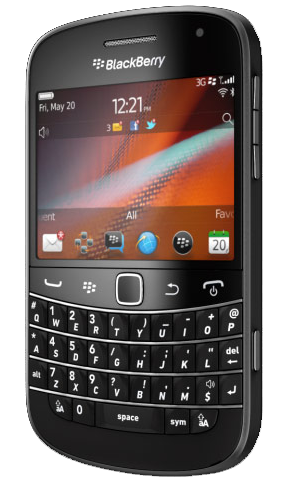Blackberry devices have never been my favorite, but a recent experience gives me reason to put them on my not recommend list. For Internet Email they are mostly straight forward, but users have to frequently delete their messages (text and emails) or the devices will encounter problems.
For the corporate client looking to use enterprise server to keep the device synced with the same email, calendar and address book as their desktop? nope. These devices are so complex, and the way they work relies on so many intricate pieces with so many points of failure they prove beyond the ability of even RIM experts to properly troubleshoot.
I can connect an iPhone, Windows Mobile, Palm or Android device to such a server within minutes. It took 3 different visits, calls to three different company tech help desks, including RIM’s own technicians at three levels and a total of 12 hours to realize the device had a defect.
The verdict is that these devices are more trouble than they are worth.


Please allow me a few observations coming from many years of first hand experience with my own Blackberrys as well as supporting many clients.
1. your experience is an anomaly.
2. you didn’t mention(maybe not aware?) the myriad of security and performance features available through Blackberry Enterprise Servers.
i.e. the wireless comm’s between handheld & BES is so well encrypted that the Gov of India wont allow them because they can’t crack them.
3. “…users have to frequently delete their messages…” there are automatic settings to handle that if you so desire. Also begs the question, what possible good, efficient purpose could you have for your handheld device’s inbox being choked with hundreds or even thousands of emails? this is entirely possible with a ‘Droid device and Gmail….I know, I carry one.
4. “…I can connect an iPhone, Windows Mobile, Palm or Android device to such a server within minutes….” Actually, no you can’t. That’s the point. It is a closed architecture system, by design. rendering it more secure AND more stable.
5. Possibly not as groovy as other handhelds you mention, but it’s not really a fair comparison, is it? They are all designed from the ground up to be a different animal than a BlkBrry.
6. “…. It took 3 different visits, calls to three different company tech help desks,….”
I have had the same experience with MANY different vendors/manufacturers. Including, but not limited to:
iPhone, Windows Mobile, Palm, Android, Dell, Sony VAIO, HP, Apple,
SonicWall, Cisco, NetGear, Motorola, etc. etc. etc.
7. I am not a “Fan Boi” of any Particular Hardware or Software platform. I think they all have their pros and cons and it is my job, and resposibilty, as a consultant to cajole, steer, coax and ultimately lead my clients to the solution that best fits their business and personal needs as well as their lifestyle.
8. Thanks, I like your writing, keep up the good work
Hey Ric, thanks for posting. I appreciate your insight and experience and am happy that you shared it for my visitors.
I am interested in “automatic settings” to handle maintaining of messages. If you could post them here or perhaps post a link to a detailed article?
My customers have been pointed to instructions on manually managing the cleaning out of their messages and emails by the carriers for their devices. My Windows Mobile devices have always allowed me to keep only x number of days of email on the handheld.
And yes, “I can connect an iPhone, Windows Mobile, Palm or Android device to such a server within minutes….”
Not to a BES of course, but the point of BES is to allow the device to sync with Exchange, Zimbra or other server and the above mentioned devices come with ActiveSync which works right out of the box.
BES may be an important security and encryption layer for many, but I doubt that the vast majority require such technology and the way things seem to be going even the United States will require the ability to monitor those packets and it will all be for naught.
You are correct though, it was an anomaly, but to be fair it was a rather frustrating and expensive anomaly that was specific to Blackberry devices. Something people might want to know prior to committing to such devices.
Again, thanks for posting and complimenting my writing.
I have had to support RIM, IOS, and Google devices, and I can honestly say that RIM is the most cumbersome and expensive for the enterprise. While RIM offers extreme security, I would agree with Brian that the vast majority will not need the enhanced security. Brian is also correct in stating that IOS, Google and Windows devices can connect via Active Sync in a matter of minutes (free, and without the need for additional proprietary software).